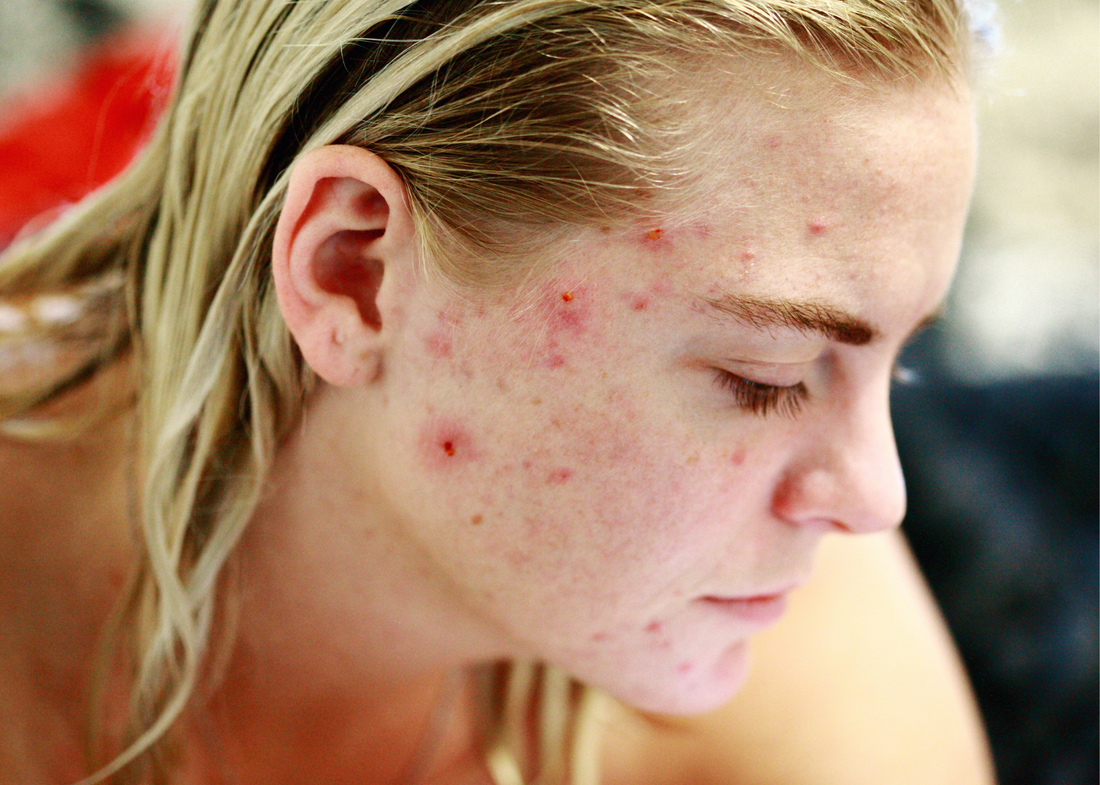|
Acne is a prevalent inflammatory skin condition which involves sebaceous sties. The main cause of acne is unknown but what we do know is that it is multi factorial and multiple factors interplay to cause the symptoms. Acne is when tiny holes in the skin, known as hair follicles, become blocked. The Sebaceous glands on our skin are tiny glands found near the surface of your skin. In symptoms of acne, the glands produce too much sebum and this excess sebum mixes with dead skin cells and form a plug in the follicles and subsequent inflammation. So, what do we know about Acne and what can we do to reduce the symptoms? One thing is for sure that the role of nutrition is vital in the treatment of acne and its role in its manifestation and treatment cannot be ignored. Acne is often linked to changes in hormone levels during puberty but can start at any age. It's also thought to be hereditary. Hormones From puberty, hormones such as androgens, oestrogen, progesterone, insulin and growth hormones stimulate sebum production and can result in acne formation in some male and females. Androgens are the hormones testosterone, DHT and the weaker androgens that regulate sebum production. Progesterone works by inhibiting the conversion of testosterone to the potent androgen DHT. Testosterone and DHT have been shown to be drivers for acne and its severity. Oestrogen plays a part in reducing sebaceous gland size as well as inhibiting testosterone secretion, and the production of sex hormone-binding globulin (SHBG) which binds to testosterone and therefore cannot convert to DHT as readily and we know that testosterone which is the primary androgens of acne. Insulin also stimulates the growth of sebaceous glands. So, our hormones are vital component for our skin health, but imbalances with these hormones can potentially trigger and exasperate symptoms of acne. Hyperandrogenism can present itself with symptoms of acne, irregular periods, weight gain, facial hair, which are also common symptoms of as PCOS which is often associated with acne in women and young girls. Unfortunately, Hormonal imbalances are often overlooked and alternative treatments such as antibiotics or steroids are used to treat the acne which often doesn’t treat the cause but just the symptom. Gut Health There are several studies that have shown a strong link between our bodies skin microbes and our bodies own immunity which can lead to acne. In fact, studies have shown that interactions within the gut microbiome and skin microbiome can cause inflammatory acne, relating to the reduction in diversity of Cutibacterium acnes and Staphylococcus epidermis. Imbalances within the gut microbiome directly impacts the skin microbiome therefore restoring the diversity and balance of gut bacterial species can help reduce inflammation within the skin and body. Antibiotic use can have a negative impact on our gut microbiome diversity resulting in imbalances. Dairy Dairy has been shown in many studies to negatively impact acne. The hormones found in milk, have a negative effect by stimulating the production of insulin-like growth factor 1 particularly during puberty. The highest concentrations of IGF-1 are found in women with acne and the number of acne lesions positively correlates with the higher plasma levels of IGF-1. Milk also contains progesterone as well as DHT which we know can be a big driver from acne. High sugar diet The consumption of high sugar, refined carbohydrates has been shown to correlate with the increase in acne symptoms. Elevated insulin levels stimulate the secretion of androgens and cause an increased production of sebum. Studies on the effects of diet on acne vulgaris have shown that occurrence of acne is lower in rural and non-industrialized areas than in Western populations where diets are higher in sugar and refined foods. What foods do we mean when we take about refined sugars/foods, they are the white breads, pastas, cakes, biscuits, sugar, sweets and processed foods. Omega 3 Omega 3 is a fatty acid known for its anti-inflammatory properties and studies have shown that it can inhibit the production of pro-inflammatory cytokines related to acne. Other skin healthy nutrients include: Zinc - Is essential for skin health and hormonal balance. It has been shown to reduce pro-inflammatory cytokines. Vitamin A- Studies have shown that high doses of vitamin a can be effective in reducing acne symptoms. Antioxidants- In a study of 47 women and 42 men with acne vulgaris it has been shown that after 12-week supplementation of vitamin E and selenium, the skin condition improved. Antioxidants reduce the reactive oxygen species that causes oxidative stress within the body that results in increased inflammation. Eat the rainbow- This provides us with all those amazing minerals and nutrients to not only support skin health but also the wonderful dietary fibre to support our gut health to positively affect our immune health and overall health. It’s about Limiting the processed, high sugar foods and replacing with whole natural vegetables and fruit, wholegrains, protein and healthy fats which can all help to support hormonal health, skin and our gut health.
If you're interested in exploring the role diet & lifestyle play in managing Acne why not book a consultation with one of the team?
0 Comments
Leave a Reply. |
Amazon Associates DisclosureNourishing Insights is a participant in the Amazon EU Associates Programme, an affiliate advertising programme designed to provide a means for sites to earn advertising fees by advertising and linking to Amazon.co.uk. Archives
December 2023
|
WHAT OUR CLIENTS ARE SAYING“I did Nutritional Therapy with Beverley and it was life changing. I highly recommend it!” Allison Blakely (Glasgow)
|
Contact Us |




